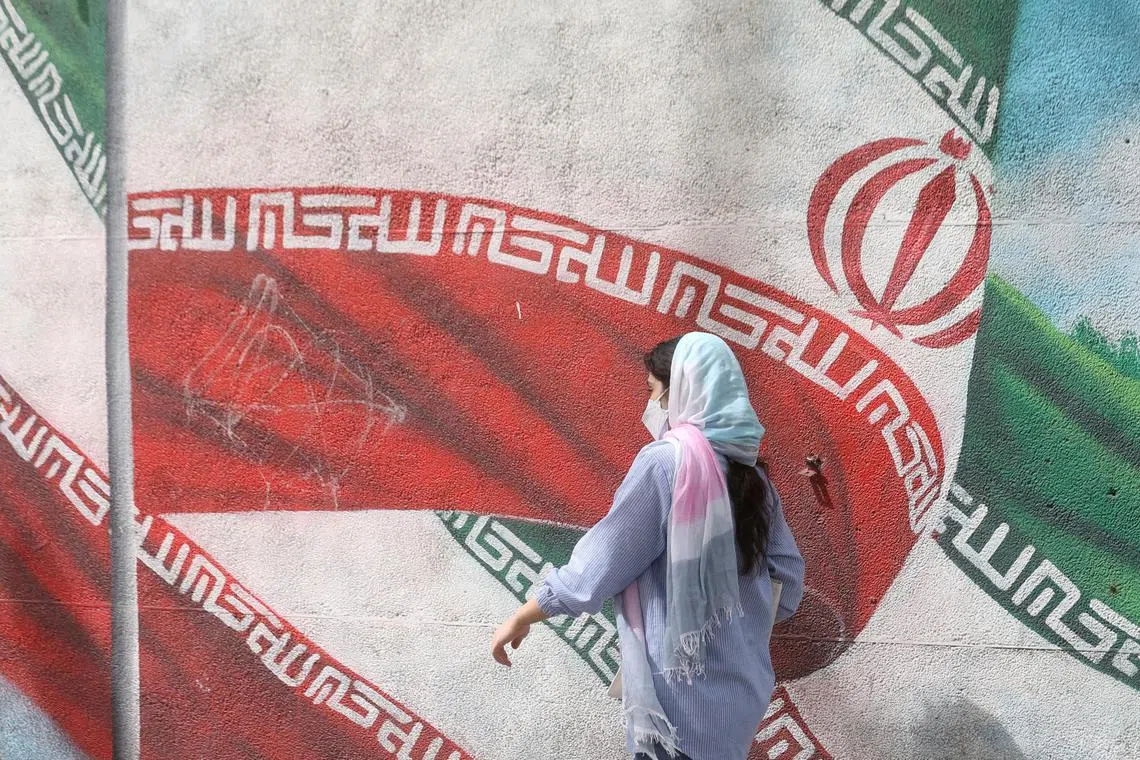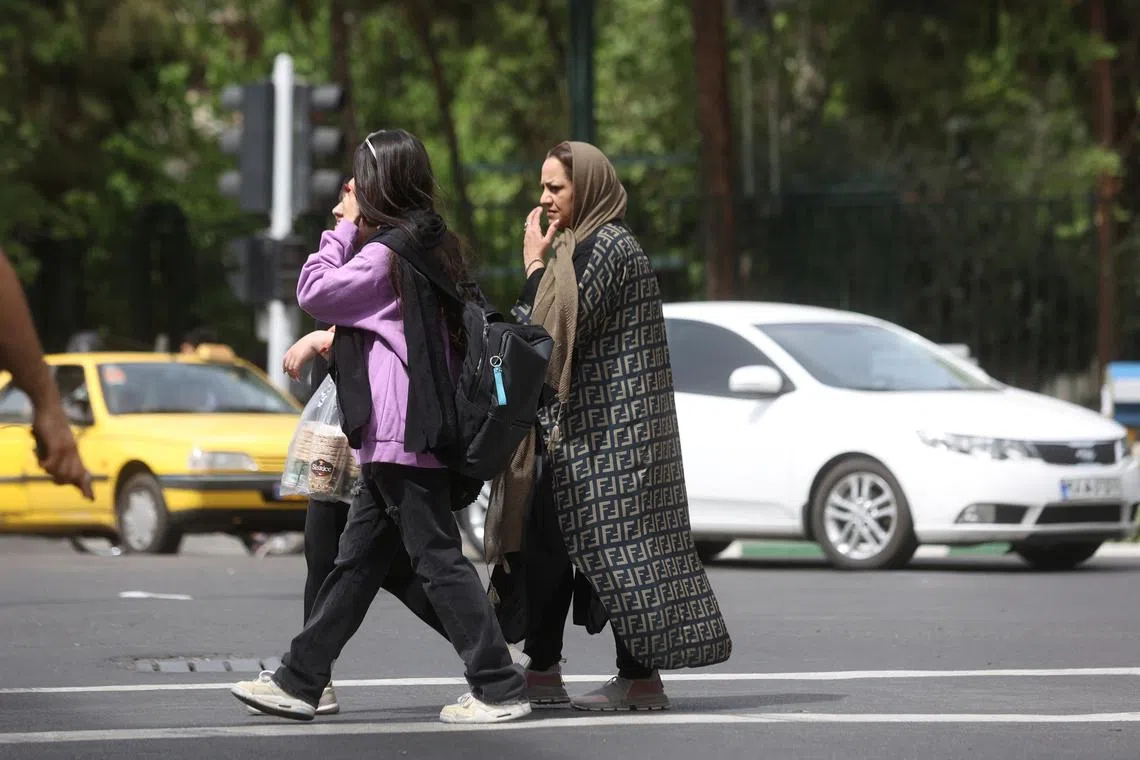Iran targets businesses to stop women defying hijab law
Sign up now: Get ST's newsletters delivered to your inbox

Women seen on surveillance footage going without hijab, in public, could be prosecuted.
PHOTO: REUTERS
Follow topic:
TEHERAN – In the first days of the Iranian New Year holiday in March, the police showed up at a cafe in Teheran with orders to shut it down for two days.
The cafe had run afoul of Iranian law by serving women who were not covering their hair with headscarves, they said.
Since then, the cafe’s management has been summoned repeatedly by the authorities and ordered to warn customers to wear their headscarves.
Mr Mohammad, the owner, grudgingly did the bare minimum, putting up a sign on the wall telling women to respect the hijab law. There is little point in doing more, he said.
Emboldened since the women-led protests that broke out in late 2022, which turned into nationwide demonstrations against the Islamic Republic, growing numbers of Iranian women have started going around without headscarves and in Western-style clothes.
In Iran, Mr Mohammad said, forcing women to wear the hijab is a lost cause.
“In all honesty, we didn’t get upset when they shut down our cafe,” said Mr Mohammad, who asked to be identified only by his first name to avoid further legal repercussions. “In fact, we felt good about it, because this is really good PR for us and our business.”
His nonchalance suggested the depth and speed of change in Iran, where the theocratic government considers the dress code a matter of existential importance.
As temperatures rise and more women go out in outfits that run flagrantly afoul of the law mandating modest clothing, official efforts to enforce it could intensify the conflict between Iranians and their clerical rulers.
Determined to reclaim control after months of destabilising protests that called its authority into question, the government recently tried a fresh tack in its campaign to enforce the hijab law. It closed 150 businesses in just 24 hours for serving improperly veiled women. It also announced that the authorities would use surveillance cameras and other tools to go after women violating the law.
Women seen on surveillance footage going unveiled in public could be prosecuted, and those caught driving without a headscarf could have their cars impounded, the police said.
Citing Iran’s Interior Minister, a member of Iran’s Parliament, known as the Majles, said recently that women who do not wear the hijab in public will first receive a warning via text message.
A second strike means the woman will be refused public services, he said, and a third could mean a referral for prosecution.
Although he did not specify what kinds of public services would be denied, the penalty may include barring affected women from banks, government offices and university and school campuses.
On Monday, the mayor of Teheran, Iran’s capital, said that guards at subway stations would begin stopping unveiled women from riding the metro, first verbally warning them and then ejecting them from the station.
Aspects of the crackdown are nothing new. For the past several years, the authorities have issued summonses to women caught driving without veils by traffic cameras, sending them to morality education centres instead of traffic school. But the announcement suggests the use of surveillance to enforce the hijab law may become far more widespread, although details are scarce about the government’s technology.
The authorities are also trying to enlist private businesses such as hotels, restaurants, cafes and bookshops, warning them to enforce the law inside their walls or risk closure.

As temperatures rise, more women go out in outfits that run flagrantly afoul of the law mandating modest clothing.
PHOTO: REUTERS
In recent interviews, workers and managers at businesses that were shut down recently said they were reluctant to comply.
Customers and tourists would no longer come, they said, adding that people were too used to their newly claimed freedom and would simply go elsewhere.
But the shutdowns, on top of a flailing economy, may increase the financial pressure on businesses.
Ms Fahimeh, 40, who works in the beauty and fashion industry in Teheran and has been flouting the hijab law, said that while she opposed “bullying” by the authorities, “I, for one, don’t want my freedom at the cost of another person suffering”.
Going without a hijab appears to be most common among privileged urbanites.
But an increasing number of women are flouting the requirement to cover their heads and dress modestly in the long, loose cover-ups known as manteaus, including in smaller cities and more conservative neighbourhoods.
When officers came to shut down Mr Mohammad’s cafe, he said, he pointed at a table where two women were sitting, one unveiled and the other wearing the conservative, full-length and all-black veil known as the chador.
“I told him, ‘Eventually you have to accept this. I’m not a sociologist, but I’m pretty sure what you’re doing has almost no effect,’” Mr Mohammad said.
“For now, it seems like the only solution the regime has is to increase the pressure on businesses.”
He added: “Eventually, the regime will give up. It doesn’t have either the capacity or the support of the majority to stand in the way of women.”
Many Iranian women still wear the headscarf, both voluntarily and because of family pressure, especially in more conservative parts of the country.
A significant conservative slice of society still supports government enforcement, and the rapid spread of unveiled women has exposed a degree of polarisation between them and more liberal Iranians.
A recent viral video showed a man in Shandiz, a city in north-eastern Iran, throwing yogurt at two women who were not wearing headscarves in a grocery store.
Mr Reza, who works as a manager at a tourism business in Isfahan province, south of Teheran, said the company was shut down for nearly three days in mid-March.
He said tourists preferred a freer environment, and forcing businesses to enforce the hijab law would harm an industry still struggling to recover from the coronavirus pandemic.
“The coercion and punishment won’t force women into wearing hijab,” he said. “Instead, it’ll make them more determined to choose their clothing freely.” NYTIMES

